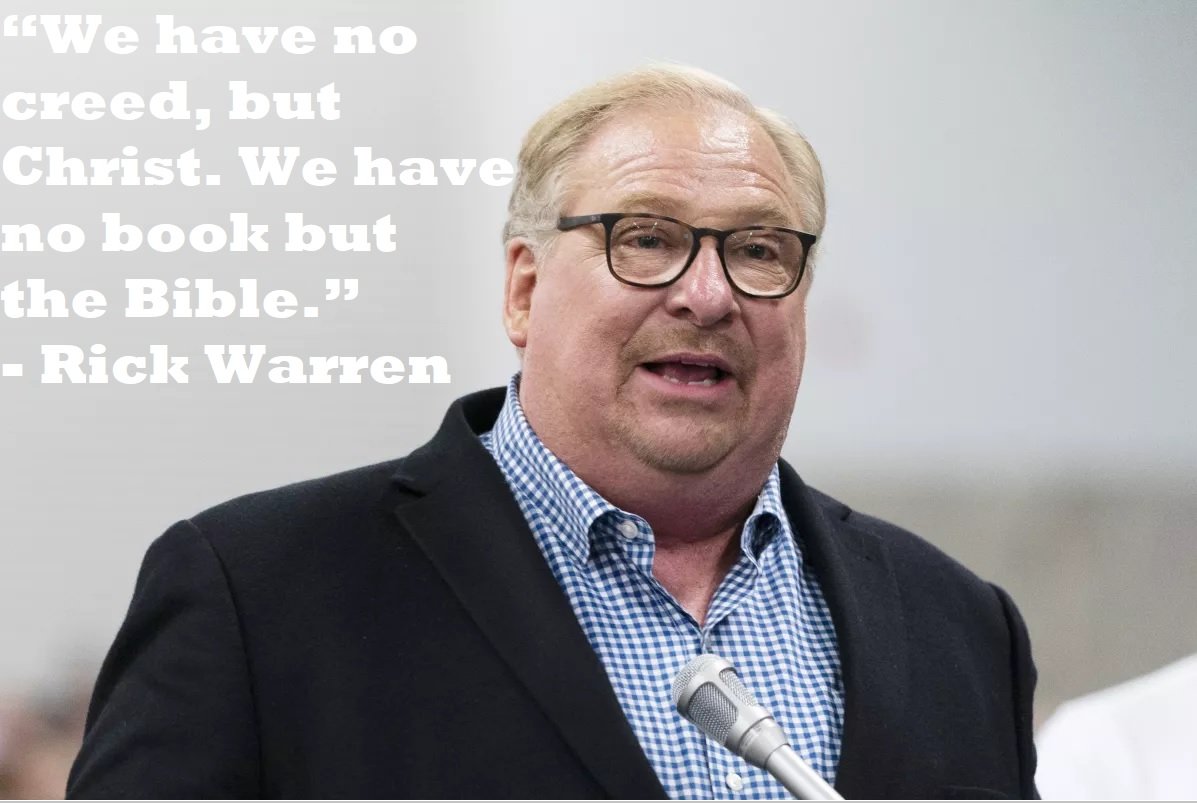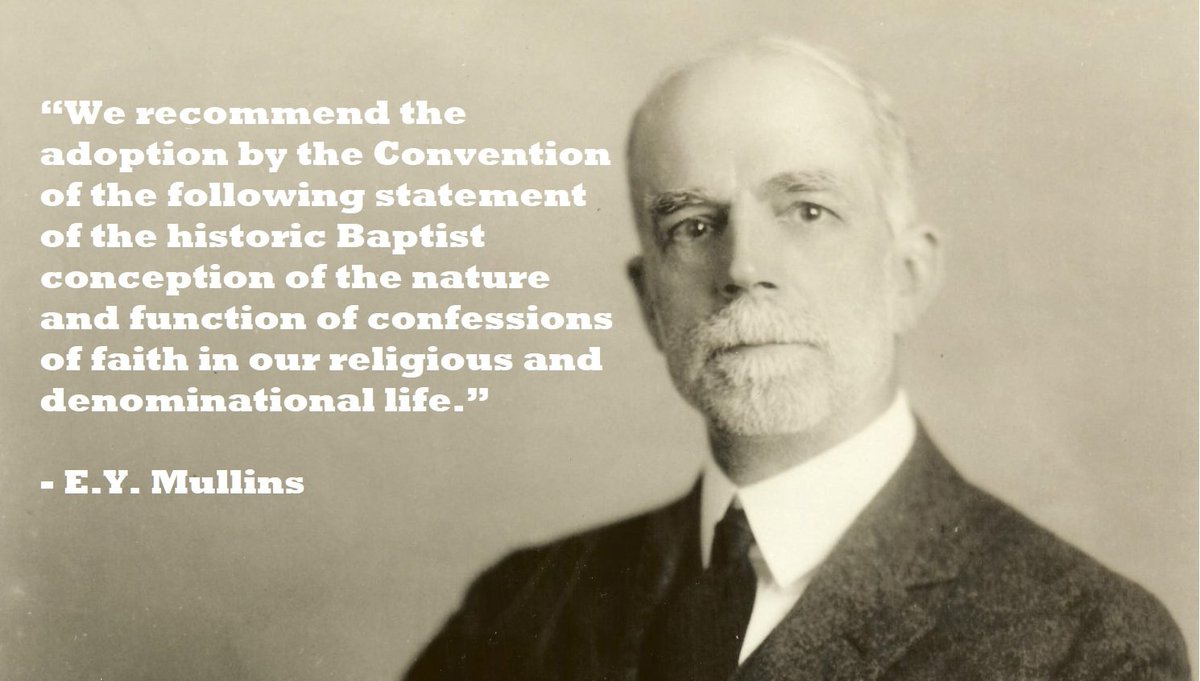@RickWarren is arguing that the solution to the SBC's numerical decline is to reject doctrinal standards. Does he know he's making the same mistake the Northern Baptist Convention made 100 years ago?
My piece in @WNGdotorg today wng.org/opinions/a-con…
🧵🧵
My piece in @WNGdotorg today wng.org/opinions/a-con…
🧵🧵
In 1922, conservatives in the Northern Baptist Convention urged the adoption of the New Hampshire Confession of Faith—the most widely used Baptist confession in the world.
A shared statement of belief would have given the convention a set of shared standards for assessing whether a church held the denomination’s common doctrinal commitments.
Those in the liberal camp, however, rejected the notion of confessionalism, insisting that the principle of local church autonomy prevented the convention from insisting on doctrinal standards for cooperation.
Sound familiar?
Sound familiar?
https://twitter.com/5577902/status/1666142446462582784
Liberals like Helen Barrett Montgomery spoke against adopting a confession, arguing "For us Baptists to have an official confession of faith would come perilously near to abandoning one of our fundamental principles."
Her argument was that adopting a "confession of faith or creedal statement" would violate Baptist polity by imposing the Convention's beliefs on individual churches.
In fact, when W.B. Riley introduced the New Hampshire confession to the floor by reading it in its entirety, a liberal pastor rose to remark, "So that's the New Hampshire Confession of Faith, is it? I thought Dr. Riley was reading off the back of a Western Union Telegraph blank."
But the the liberals had a trick up their sleeve. Cornelius Woelfkin, a close friend of Harry Emerson Fosdick, rose with a substitute motion: "We affirm that the New Testament is the all-sufficient ground of our faith and practice, and we need no other statement." Sound familiar? 



After three hours of debate the vote was taken. Woelfkin's amendment was adopted by a margin of two to one, 1,264 to 637.
The Convention wouldn't even affirm the New Hampshire Confession of Faith.
The Convention wouldn't even affirm the New Hampshire Confession of Faith.
This failure to adopt doctrinal standards led to a crisis in 1925 when the noted liberal Harry Emerson Fosdick succeed the liberal Cornelius Woelfkin as pastor of the famous Park Avenue Baptist Church of New York City.
Fosdick differed most fundamentally with Baptist principles not over female pastors but over “open membership”—whether a professing believer can be admitted to membership in a Baptist church apart from being baptized as a believer.
As a pastor, Fosdick had openly expressed his disdain for Baptist confessionalism, insisting that baptism was “altogether an individual affair.” And he could not have cared less whether baptism was by immersion or sprinkling.
Park Avenue’s decision to call Fosdick set the church on a collision course with conservatives in the Northern Baptist Convention, who argued that Fosdick’s practice of “open communion” put the church outside of doctrinal alignment with the convention. They were clearly correct.
In 1925 conservatives argued that the enrollment committee ought not admit the delegates of Fosdick’s church since, through the practice of “open communion,” the church was effectively no longer Baptist.
In a remarkable statement the chair responded that the convention did not possess any definition of what constituted a Baptist church! Conservatives protested his decision, but the Convention sided with the Chair, voting 912 to 364 to seat the Park Avenue delegates.
Conservatives tried again in 1926 to disfellowship Fosdick's church but this too failed.
They tried to clarify that the question was not about what authority the Convention had to dictate the faith and practice of a local church, but whether the Convention could define its terms for cooperation in any other way than the Bible commanded.
When the time for debate ended and the time to vote finally came, the vote to define a Baptist church as a church that practiced believer's baptism lost by a vote of 2,020 to 1,084.
Southern Baptists took a different approach by adopting a modified form of the New Hampshire Confession at the Convention in 1925.
While presenting the report of the Committee, E. Y. Mullins explicitly affirmed the confessional nature of the Southern Baptist Convention, saying... 

“We recommend the adoption by the Convention of the following statement of the historic Baptist conception of the nature and function of confessions of faith in our religious and denominational life.”
The differences between Northern and Southern Baptist Conventions over the past 100 years can be explained many ways—but they cannot be explained apart from the question of confessionalism and the need for doctrinal fidelity.
There's a lesson here both in convention politics and in Baptist polity. Liberal arguments often favor ambiguity in ways that sound pious. They spoke of "loyalty to Christ" rather than belief in his divinity. They preferred faith in the New Testament to carefully crafted creeds.
Far from undermining the authority of Scripture, confessions protect the authority of Scripture by clarifying its content. If you refuse to explain what you believe the Bible teaches, it begs the question of whether you believe in the Bible at all.
RT the tweet below to share this thread with your friends
https://twitter.com/34686037/status/1666807865154355202
• • •
Missing some Tweet in this thread? You can try to
force a refresh

 Read on Twitter
Read on Twitter







